Winning at poker is more than a lucky deal of the deck. Poker is one of the games at the casino where your gaming skills can make the difference between your ability to build a winning hand and folding with fewer chips than when you started. One of the most important elements in building your poker skills involves your willingness to invest in some poker game analysis. By analyzing your poker games you’ll be better able to correct your mistakes and expand on your strengths.
Are you willing to expend the time and effort to improve your game? You don’t need to jump in and do everything at once…..spend half an hour every day analyzing your gameplay and you’ll soon see the rewards!
Skill
Most casino games are largely games of chance but poker is one of the only casino games that’s considered a game where skill plays a big part in determining a player’s success. There are a few reasons for this.
Because skilled player have learned to understand the probabilities of different hands and outcomes, they are better able to make informed decisions which allows them to perform more competently at the poker table. Land-based poker players become proficient at “reading” opponents which allows them to make informed decisions based on their opponents’ likely actions. Skilled players know how to exploit the psychological weaknesses in their opponents through strategies such as effective bluffing and deception.
There are effective risk management strategies that successful poker players learn. These strategies include learning how to efficiently manage a bankroll, understanding when and how much to bet and when the perceived odds of winning/minimizing losses dictate the right time to raise, fold or call.
Skilled players develop the ability to adapt strategies based on changing circumstances – opponents’ playing styles, table dynamics, the player’s own position in the game, etc. A poker player who doesn’t understand how to become adaptable and flexible will not perform well.
Poker analysis is an outgrowth of learning how to make complex decisions under conditions of uncertainty. Skilled poker players learn game theory principles that teach them how to analyze situations so that they can make optimal decisions based on perceptions of both immediate and long-term consequences. Simply put, becoming successful at poker is dependent on the willingness to keep learning.
Playing poker proficiently involves being ready to evolve your gameplay with new techniques and new strategies. To maintain an edge, a skilled poker player will invest time and effort in studying the game, analyzing his/her own gameplay and learning from others.
Poker Analysis
If you’re playing poker at the casino, either online or in person, you might enjoy a lucky streak. But in the long term, success is determined by skill. Poker players must demonstrate their skill by outthinking, outmaneuvering and outperforming their opponents over the course of many sessions. To do that, you need to analyze your gameplay by looking at the strategic landscape, hand analysis, statistical modeling, the dynamics of psychology and game theory.
Strategic Landscape
Basically, when you play poker, you are making decisions based on your assessment of your opponents’ hands. You need to bet, trade cards or fold based on your ability to leverage your understanding of probabilities and game theory. The better you perform these tasks, the more of an edge you’ll build for yourself.
Hand Analysis
You will want to analyze your hand by evaluating factors such as community cards, hole cards and the cards that you think that your opponents will be holding. Analysis will enable you to discern optimal strategies and balance risk and reward so that you can maximize your chances of success in any set of circumstances.
Statistical Modeling
Today’s AI and other types of computational tools make poker analysis more exacting than ever. There are statistical models that you can employ including equity estimations and expected value calculations. These analytical tools provide invaluable insights into the decision-making process. Through the power to harness data and algorithms you will be able to refine strategies, mitigate the impact of variance and identify patterns to help you in your gameplay.
Psychology
If you play poker at a land-based casino or at another venue with other people in real time, you should become familiar with how psychology influences poker play. Poker may be a mathematical contest but it’s also a battle of wits where players must decipher their opponents’ intentions and detect patterns of behavior. If you want to be a successful poker player while playing in person you need to master the art of deception by understanding psychological dynamics like table image, aggressive play and player “tilt” (mental or emotional confusion).
Game Theory
Game theory involves the mathematical framework that’s used to analyze strategic interactions. It’s the blueprint for optimal decision-making in which both exploitative and equilibrium strategies are considered. Through game theory and other mixed strategies, you can devise tactics that withstand adversarial moves.
Poker game analysis involves the intersection of strategy, mathematics, and psychology. If you learn to understand these dynamics you’ll gain valuable insights into the game's inner workings which will set you on your journey towards poker success.

